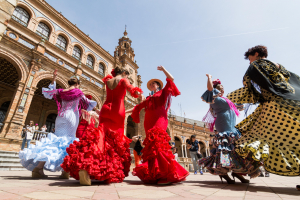
Blog
RCI 50th Anniversary
On February 4, 2024, RCI celebrated its 50th anniversary. We join in congratulating our valuable partner.
The story of RCI's successful journey can be read HERE
We would like to share the history of relations and successful cooperation between RCI and our company Help Line International.
When RCI opened its office in Moscow in 1996, they encountered confused timeshare buyers who were demanding refunds for their timeshare purchases from RCI, thinking that they had purchased from RCI and not from the marketing companies.
In 1996, gave our valuable assistance to the newly opened Moscow office of RCI and since then we have been working together for many years.
We took over the hard task of explaining to the timeshare buyers or owners that the exchange company had nothing to do with their money at the stage of purchasing timeshare, since it receives an application for registration in the exchange system and a very small amount at the very last stage, when it is already registered new club membership and issued a certificate of ownership to the new member.
We were explaining the confused timeshare buyers the procedure of purchasing timeshare, but also we offered to help them track their money and get them the ownership documents directly from the Resort Developer if the marketing company disappeared. For this purpose, we developed special programs where the costs of obtaining documents for members after their financial losses were minimal and affordable.
We negotiated special terms with RCI for timeshare buyers who were harmed by the lack of legislation and lost some or even all of their money buying a timeshare with the indecent marketing companies.
Together with RCI, we worked together to restore the good name of timeshare in Eastern Europe.
Thus, in 1997–1999. We have registered more than 200 members with RCI under special conditions. Many of them continue to vacation and travel with RCI today. In total we have registered over 600 new members with RCI, most of whom would not have become members without our help as they lost money on their original contract which was not completed.
Another important service we have provided to RCI is the assistance of our travel managers to RCI members with their travel arrangements.
Someone had to help the Russian members prepare, apply and obtain tourist visas, which were quite difficult to obtain at first.
Another difficulty was buying inexpensive charter tickets, since travel agencies refused to sell them outside of the package, without accommodation, which is absolutely not necessary for those wishing to live in a timeshare resort.
If it had not been for the services of our travel department in the early years of timeshare in Russia and before RCI was able to organize its own travel department, we believe hundreds of families would have given up their membership.
At that time, RCI gave us status as their official Help Line and recommended us to its members if they had questions about timeshares not related to RCI:
- disagreements with the Club Management Company,
- issues related to maintenance bills,
- reinstatement of club membership,
- re-registration and assignment of rights,
- legal advice or
- consultations on use.
One of the most fruitful was a project called “We want you to come back.” The essence of the project was to help renew RCI membership to those families who were expelled from the Club for late payment of the membership fee and where the Club refused reinstatement.
We negotiated special terms with several Resort Founders and transferred such families to new Clubs on favorable terms while maintaining or improving their membership levels.
RCI has written to such members to ensure that they do not hesitate to call our Resort Helpline hotline for further details. In many cases, members benefited not only from the improved quality of their new property, but also from a price that was often less than if they had been able to reinstate their membership by paying off all debts.
Since 1996, we have organized hundreds of exchanges and extra week trips for RCI members who, for whatever reason, were unable to arrange their holiday using RCI (mainly because they were initially ill or not explained how the system worked. These families were planning to cancel their membership, but with the help of our travel managers, they were able to go on vacation, learned how to use the system, and many continue to enjoy their vacation through the club system for many years.
And now we remain close partners. We help Russian timeshare owners who are RCI members pay for their membership, exchanges, and extra weeks to continue enjoying their RCI travel.
We wish the next 50 successful years to our valued partners and excellent colleagues!
Global Insights: Analyzing Timeshare Resale Markets Worldwide. Part 4: What's Wrong with Finnish and Scandinavian Timeshare Resale Market
Of all the Scandinavian countries, the most active buyers of timeshares are the Finns.
Finland is indeed a unique country when it comes to timeshares.
The timeshare boom in Finland coincided with the economic boom of Finland as a whole and was not related to foreign visitors, as was the case in other countries.
Finnish resort developers, having studied the concept of club vacations, promoted it as domestic tourism and property ownership.
Finnish legislation is unlike any other: Each cottage at the resort is registered as a separate company, which is part of a consortium of companies (club). When you buy a timeshare, you acquire shares and become a shareholder of a separate company, and your rights are securely protected, just like the rights of a shareholder. Your membership fee is a contribution from shareholders to cover the company's expenses. Dividends are received in the form of a week's stay in apartments.
The resort group Holiday Club Finland Oy is the industry leader in timeshares, with high quality standards, covering all the most attractive regions of Finland, Sweden, and Norway, and even expanding to Spain and the Canaries. The company is very prominent. It successfully promoted corporate business at one time. This is when large organizations acquire several weeks of ownership to provide vacations for their employees.
Finnish timeshare business is characterized by such clarity and transparency that in 2010, the Finnish government bought the company Holiday Club Finland Oy as a highly profitable enterprise.
What could give an even higher rating of reliability and quality to the timeshare market than the participation of the state itself as an investor?
However, this event radically changed the strategy of Holiday Club Finland Oy. The project in St. Petersburg and several other countries was shut down because the Finnish government logically decided that it was better to attract neighbors to purchase property in Finland, thereby developing its regions, ensuring the influx of foreign funds, and enjoying taxes in its treasury, rather than boosting the economy of other states.
Thus, the Saimaa project near the Russian border developed, where one of the main developers became Holiday Club Finland Oy.
What about the resale market?
It is very weak and very Finnish. Finns primarily buy timeshares in Finland and also in the Canary Islands, at resorts traditionally cooperating with the Scandinavian market.
Residents of Scandinavia have a special taste. They prefer modern eclecticism. Resorts satisfying the tastes of the British, Spaniards, and Eastern Europeans are rarely to their liking.
Holiday Club Finland Oy and several Finnish resorts resell their timeshares through their own sales structures. However, it is possible to sell at a price of only 60% of the resort's rates. Your week will be added to the list of offers seen by all consultants, and if it is in demand, it will be sold fairly quickly. There is also an additional price list of the resort used for the exchange of others' timeshares. To get your offer on this list, you must be willing to give up your timeshare for only 40%.
Not much? We agree with you. But it is reliable and hassle-free and does not require advance payment of fees or advertising costs.
This is very beneficial for the resort, which keeps prices high.
Another way to resell a Finnish timeshare is to contact a real estate agency. It should be noted that in Finland, mostly small local agencies operate, offering real estate and, accordingly, timeshares "in the area." There are several such agencies in every small town, and you need to sign an exclusive contract with them.
In general, the chance that your potential buyer will visit this particular agency is more elusive than real. The exception is the sale of a timeshare at the Holiday Club Katinkulta, where in the town of Vuokatti you will have a chance to sell the timeshare of this club through a real estate agency due to the extreme popularity of the club and this tourist region.
What about those whose timeshares are not in Finland?
They turn to international agencies such as Travel & Leisure Group Ltd. (https://www.travelandleisuregroup.co.uk ) and Timeshare Online (https://www.timeshareonline.eu/index.php ), Confused About Timeshare Ltd., World Wide Timeshare Hypermarket, and others with a unified database across Europe and a multilingual call center or network of national branches, and most importantly, with a bright, attractive, and information-filled website.
Those who are dissatisfied with the low prices described above also turn there.
Travel & Leisure Group Ltd. has had a Scandinavian department since 2001, which at some point accounted for as much as 50% of all sales. Even though most Finns and Swedes are fluent in English, communicating in their native language is always easier.
In summary: The Finnish market is very narrow even for those with Finnish timeshares, and its prices are beneficial for buyers rather than sellers. If Finns themselves turn to English resale agencies, there is no need to create difficulties for yourself out of nowhere. Then you would have to translate the contract from Finnish to Russian in such a delicate situation. Well, you wouldn't sign a contract when not everything is necessarily in your favor.
Global Insights: Analysing Timeshare Resale Markets Worldwide. Part 3 Why You would Not List with the Spanish Agencies?
For a long time, it didn't occur to marketing companies that Spanish timeshares might interest Spaniards. They sought buyers for Spanish resorts in England, Scandinavia, Eastern Europe, and even Italy. Unexpectedly, 15-17 years ago, Spaniards became active timeshare buyers. They were invited to presentations, and Spanish sellers representing resorts emerged.
As a result, all resale companies opened offices on the Costa del Sol coast. But hopes for Spanish buyers in the resale market didn't materialize. Spaniards continued buying timeshares only at presentations.
On one hand, Spanish offices had many clients who visited rather than called. This was crucial because face-to-face conversations took twice or even three times longer than phone calls. Most were families who had just signed timeshare contracts at presentations and deposited money. They came to clarify and check if their purchase was too expensive. Even when offered better buying conditions significantly cheaper than at presentations, they needed to return to the club where they bought at presentations to cancel the contract and get their money back. There, they were convinced that buying from the resale market wouldn't give them additional benefits like contractually promised free weeks, flight vouchers, free 3-year RCI membership cards, plus the reassignment took a lot of time. Plus, all the extra worries and hassle, etc.
At some point, resorts learned to assert their rights to deal with customers in 80%-90% of cases. Many resale agencies closed within a year or two of struggling. Some large companies like Travel & Leisure Group Ltd. and World Wide Timeshare Hypermarket Ltd. continue to support these low-profit, less effective resale departments in Spain.
At the same time, in recent years, this niche in Spain has been filled by suspicious or blatantly fraudulent companies offering different resale conditions supposedly from Spanish companies on Spanish territory. Every year, a significant number of these companies are caught by Spanish law enforcement agencies, but after a while, new ones appear with slightly modified conditions for customers and a mandatory guarantee of quick and effective resale. The peak of attacks on Russian timeshare owners by Spanish fraudulent companies was from 2008 to 2016 when several major resorts couldn't protect access to their customer databases. As a result, club members, even those who had never been interested in selling, received letters and calls from Spain with very "chocolate" conditions. If you have been a victim of such scammers in the past, they may already be under investigation today. Please contact law enforcement for information or seek assistance from specialists (that's us).
Spaniards today mostly choose large international agencies such as Travel & Leisure Group Ltd. (https://www.travelandleisuregroup.co.uk ) and Timeshare Online (https://www.timeshareonline.eu/index.php ), Confused About Timeshare Ltd., World Wide Timeshare Hypermarket, etc., with a unified database across Europe and a language call center or network of national branches, and above all with a bright attractive and information-rich website.
In conclusion: We do not recommend wasting time contacting Spanish agencies because at best, you will end up as a customer of a regional branch of a large international company, complicating your relationship with the agency with the Spanish language. At worst, you may fall victim to scammers or one-day companies.
Global Insights: Analysing Timeshare Resale Markets Worldwide. Why the UK Timeshare Resale Market is the most Successful?
In the previous article about resale markets in different countries, we provided detailed insights into the market. As of today, according to specialists, British agencies are considered the most reliable and effective for selling European timeshares. Let's discuss why.
Let's start with historical background. The UK is the birthplace of timeshare in Europe. After its successful launch in America, timeshare sellers became interested in the old continent, particularly in the UK, which shares much with the US besides language. The first British resorts emerged one after another based on historic estates, aiming to attract both patriotic Britons and Americans fond of antiquity.
The concept of holiday property ownership required swift development of legislation regulating relationships between buyers and sellers, as well as between club members and resort founders and management companies.
While the emergence of timeshare resorts and the primary timeshare market progressed rapidly, the secondary timeshare market developed gradually, experiencing trial and error in various forms (from presentations to home visits by agents). Over the years, common rules of the secondary market have remained largely unchanged, as the most effective advertising and sales methods were established.
The activity of timeshare resale agencies in England is governed by the strictest timeshare legislation in Europe. Despite the controversial reputation of timeshare in the UK, with criticism of sales pressure and aggressive techniques during presentations, as well as historical bankruptcies and fraud before legislation was introduced, Britons continue to be the most active timeshare buyers.
This is partly due to the UK's financial policy supporting pensioners in buying second homes (including fractional ownership, a type of timeshare), and the climate encouraging Britons to holiday in Spain, Portugal, Malta, Cyprus, Morocco, etc., with budget airlines making these trips accessible. Additionally, beyond media horror stories, every Briton knows several families who own and enjoy timeshares, contributing to its normalization.
But most importantly, the UK boasts the most effective and stringent timeshare legislation today, protecting buyers' and club owners' interests and regulating companies' behavior in the market. Thus, acquiring a timeshare in the UK is the most reliable and secure option.
Experience and knowledge have accumulated in the country. Besides small companies that appear and are absorbed periodically, three major players operate in the market:
The most notable figure in the resale market is Travel & Leisure Group Ltd (https://www.travelandleisuregroup.co.uk), known to us due to our partnership since 1997. Travel & Leisure Group Ltd or Travel & Leisure Advisory Services (TALAS). Once upon a time, RCI and II allowed advertisements in their magazines, and Travel & Leisure Group Ltd featured in every issue. Therefore, older sellers and buyers tend to choose them. Travel & Leisure Group Ltd's methods may seem traditional, but they yield results. To this day, Travel & Leisure Group Ltd advertises in newspapers, both international and local editions. They also advertise extensively in the in-flight magazines of airlines like Ryanair and EasyJet, targeting individual tourists, often families, who search the internet for the best deals. Another interesting strategy is their stand at the largest London exhibition center with high traffic, offering attractive deals not only for purchasing but also renting apartment weeks. Travel & Leisure Group Ltd is also the official partner of prestigious European groups like Club La Costa, Marriott Vacation Club, Diamond Resort, etc. This endorsement by the clubs directs clients, not only sellers but also buyers interested in buying weeks in their own club, towards Travel & Leisure Group Ltd.
The second interesting participant in the secondary market is World Wide Timeshare Hypermarket Travel & Leisure Group Ltd. At one point, Hypermarket even rivaled Travel & Leisure, for example, sponsoring shows about timeshare on a tourist satellite channel. However, Hypermarket eventually lost its priority position and now ranks third among agencies. In reality, it has ceded its ground to young, enterprising competitors like Confused About Timeshare Ltd. It may be conditionally called young; the agency has been in business for over 15 years, and its founder has worked in timeshare for over 25 years. However, this agency pursues an ultra-modern advertising policy, utilizing all online advertising and social media opportunities. Consequently, their audience is significantly younger than Travel & Leisure's. These are families and travelers who independently book their vacations online and use search engines for any purpose.
In conclusion, if you want to reach the widest audience of buyers, in our opinion, the most advantageous approach would be to choose Travel & Leisure Group Ltd (https://www.travelandleisuregroup.co.uk ) and Timeshare Online (https://www.timeshareonline.eu/index.php ). These are the agencies we would like to draw your attention to because, based on our experience, other players in this market significantly lag behind in efficiency or prevalence.
Global Insights: Analyzing Timeshare Resale Markets Worldwide. Part 1: Timeshare Resale Market of USA.
With this article, we begin a series of articles about market differences and national timeshare resale agencies.
The American and European timeshare markets are fundamentally different. Fundamentally because they have serious legislative differences, marketing differs too much, and the actions of buyers themselves vary.
American buyers primarily purchase timeshares in resorts located in USA, the Caribbean region, Mexico, and other South American countries. The most popular are timeshares in the Hawaiian Islands, the lake district of Utah, the area of numerous amusement parks in Orlando, and the tip of Florida Keys and in California. And, of course, there are well-known hotel groups that have their own timeshare complexes – Marriott, Hilton, Melia, Ritz Carlton, and others.
If the timeshare you want to sell is located in USA (South, North, Central, and in the Caribbean), it's worth considering the American market for resale.
- Do Americans really not buy timeshares in Europe?
- They do. But, of course, not as much as on their own continent. Americans purchase timeshares exclusively if they are in the region where their roots are, to visit distant relatives or not lose their roots. For this, they choose timeshares in ancient English estates, French castles, Tuscan and Ligurian villas. Only such exclusivity can justify the purchase of cramped apartments by American standards.
American apartments are almost twice the size by standards compared to European ones. Also, it should be noted that exchanging (intercontinental) a European timeshare for an American one will always cost twice as much, and if an American family does not plan to holiday in Europe annually, it is still preferable for them to own an American timeshare. For a complete picture, add extremely cheap domestic flights in USA and their diverse geography.
American (including Canadian) agencies are very similar to real estate agencies; for their work, they must obtain a real estate sales license, which requires mandatory education – the course is quite expensive and lengthy, the exams are serious, but the responsibility of the agencies is high financially.
There are agencies that, like in real estate, do not take upfront payments, but they also do not advertise timeshares. In this case, the buyer is someone living nearby or someone who knows this agency, who is more interested just in case if they have timeshares for sale. Most often, they offer secondary weeks of resorts located nearby. Their already small number of sales decreases annually because buyers go to global internet resources.
Most agencies take money upfront for advertising, as well as a percentage of the sale. In some cases, they also sign an exclusive contract. The cost of advertising is two to three times higher than European prices. This doesn't bother Americans, who are used to paying high fees to specialists.
Americans set prices on average 25%-30% lower than primary market prices. Americans don't need to be explained that the secondary market is lower than the primary one and that it's impossible to sell for the same amount as bought, unless at least 30 years have passed of "inflations-devaluations-tourist booms of the region," etc. High prices on the secondary market are rare – it's usually an overconfident owner who considers their timeshare extremely exclusive. This won't take them far. The prices listed on the website and in price lists do not include agency fees of 5%-10%, as well as expenses for checking and re-registering the timeshare and taxes.
Also, don't forget that although tens of thousands of timeshares are sold and bought annually in the USA, the number of timeshares listed for sale is many times higher. Among them are not very popular resorts and at extremely low prices.
We actively cooperate with American companies when buyers approach us for famous resorts on American continents and also carefully monitor changes in this market.
Let's summarize: the timeshare that can be sold on the American market is primarily a timeshare of an American resort in a popular tourist area. If you want to sell a timeshare in Tenerife or Costa del Sol, taking it to America is a waste of money and time. There's plenty of similar properties there, but more modern and more comfortable.
ABOUT US
Unique company, the only one on the territory of CIA that specializes in timeshare issues of all the arias and complications. Operational since 1996.
Our services
Recent Posts
- Global Insights: Analyzing Timeshare Resale Markets Worldwide. Part 4: What's Wrong with Finnish and Scandinavian Timeshare Resale Market
- Global Insights: Analysing Timeshare Resale Markets Worldwide. Part 3 Why You would Not List with the Spanish Agencies?
- Global Insights: Analysing Timeshare Resale Markets Worldwide. Why the UK Timeshare Resale Market is the most Successful?
- RCI 50th Anniversary











